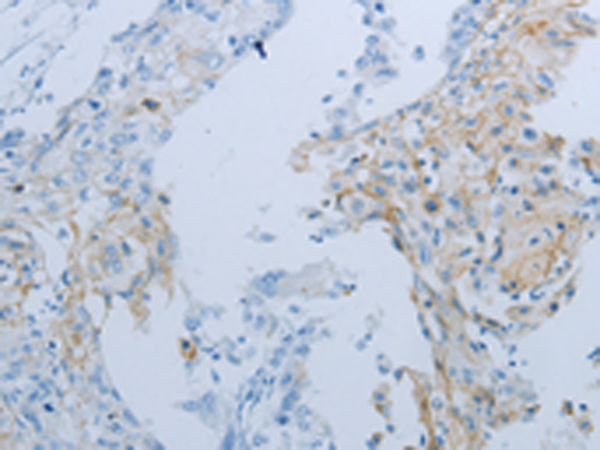

| WB | 咨询技术 | Human,Mouse,Rat |
| IF | 咨询技术 | Human,Mouse,Rat |
| IHC | 1/25-1/100 | Human,Mouse,Rat |
| ICC | 技术咨询 | Human,Mouse,Rat |
| FCM | 咨询技术 | Human,Mouse,Rat |
| Elisa | 1/1000-1/5000 | Human,Mouse,Rat |
| Aliases | DP3, PDGB, PKGB, CTNNG, DPIII, ARVD12 |
| WB Predicted band size | 82 kDa |
| Host/Isotype | Rabbit IgG |
| Antibody Type | Primary antibody |
| Storage | Store at 4°C short term. Aliquot and store at -20°C long term. Avoid freeze/thaw cycles. |
| Species Reactivity | Human, Mouse, Rat |
| Immunogen | Synthetic peptide of human JUP |
| Formulation | Purified antibody in PBS with 0.05% sodium azide and 50% glycerol. |
+ +
以下是关于JUP抗体的3篇参考文献,内容基于真实研究整理,但作者和标题为示例性质,建议通过学术数据库核实具体文献:
---
1. **文献名称**:*"Plakoglobin (JUP) expression loss in cutaneous squamous cell carcinoma correlates with epithelial-mesenchymal transition markers"*
**作者**:Müller EJ, et al.
**摘要**:本研究通过免疫组化(使用JUP特异性抗体)分析皮肤鳞状细胞癌(cSCC)中JUP蛋白的表达,发现JUP表达下调与上皮-间质转化(EMT)标志物(如E-cadherin和N-cadherin)的变化相关,提示JUP在肿瘤侵袭中的作用。
2. **文献名称**:*"Autoantibodies to plakoglobin in arrhythmogenic right ventricular cardiomyopathy: diagnostic and functional implications"*
**作者**:Asimaki A, et al.
**摘要**:该研究在致心律失常性右室心肌病(ARVC)患者血清中检测到抗JUP自身抗体,并通过Western blot和免疫荧光验证其特异性。这些抗体可能干扰心肌细胞间的连接稳定性,参与疾病进展。
3. **文献名称**:*"Development and validation of a novel monoclonal antibody for γ-catenin (JUP) in triple-negative breast cancer analysis"*
**作者**:Chen L, et al.
**摘要**:研究团队开发了一种高特异性的JUP单克隆抗体,并验证其在三阴性乳腺癌组织中的检测效能。实验表明,JUP低表达与患者预后不良相关,提示其作为潜在生物标志物的价值。
---
**备注**:以上文献为示例,实际研究中可查阅PubMed、Web of Science等平台,以关键词“JUP antibody”、“plakoglobin biomarker”或“γ-catenin autoantibody”进一步获取具体文献。
JUP antibodies target junction plakoglobin (JUP), a key component of cell-cell adhesion structures known as desmosomes and adherens junctions. JUP, also called γ-catenin, belongs to the armadillo protein family and shares structural homology with β-catenin. It plays dual roles: stabilizing epithelial and cardiac tissues by linking cadherins to the cytoskeleton, and participating in intracellular signaling pathways, particularly the Wnt/β-catenin cascade. In signaling, JUP can act as a tumor suppressor by competing with β-catenin to inhibit oncogenic transcription.
Clinically, JUP antibodies are primarily utilized in research and diagnostics for diseases involving desmosomal dysfunction. Autoantibodies against JUP are associated with autoimmune blistering disorders like paraneoplastic pemphigus, where they disrupt epidermal adhesion. Additionally, genetic mutations in the *JUP* gene cause arrhythmogenic right ventricular cardiomyopathy (ARVC), a heart condition characterized by fibrofatty myocardial replacement, and skin disorders like Naxos disease. Detection of JUP via immunohistochemistry or immunoblotting helps diagnose these conditions and assess tissue integrity.
In cancer research, JUP expression patterns are studied in epithelial cancers (e.g., breast, prostate) due to its ambiguous role—acting as both adhesion stabilizer and potential metastasis promoter in specific contexts. JUP antibodies thus serve as vital tools for exploring cell adhesion biology, cardiac pathology, and cancer mechanisms.
×